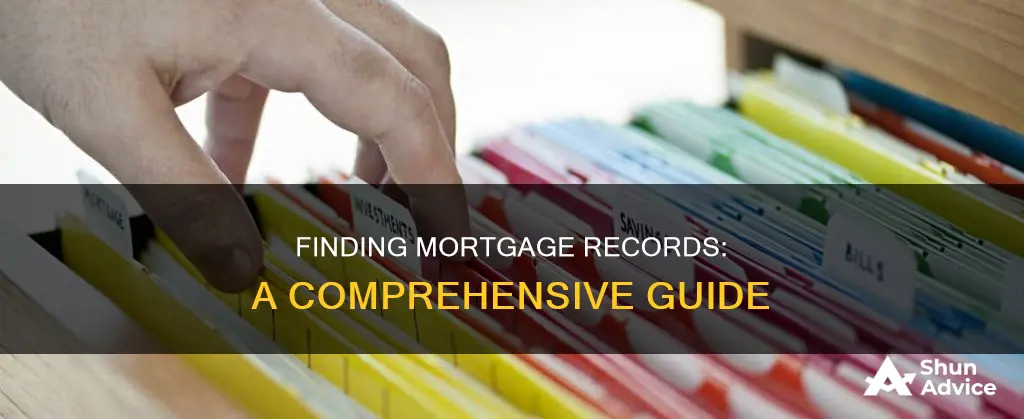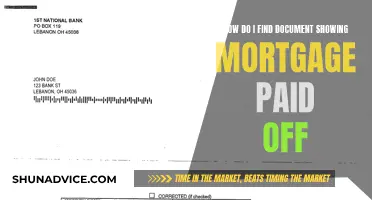
If you're looking to find out more about a property, looking up its mortgage records is a great way to get started. You can often access these records by using the property's address, and they can tell you a lot about a home and its owner. For instance, you may be able to find out about previous sales, listings, and the price for which the property was listed or sold in the past. You can also find out how many times the home has been listed, removed, and relisted. Mortgage records are held by the county in which the property is located, and most counties now have digital versions of their records for easy viewing. However, it's important to note that to protect the seller's privacy, some information is not available as a public record.
| Characteristics | Values |
|---|---|
| Record Type | Public records |
| Record Contents | Deeds, mortgages, assessment data, tax details, parcel maps, mortgage satisfactions, mortgage releases, notary commissions, military discharge requests |
| Record Sources | County courthouse, clerk's office, town, public records websites, real estate websites |
| Record Search Parameters | Name, document type, book and page number, consideration (selling price), parcel ID, recording date, recording number, legal description, Torrens number, address |
| Record Access | Online, in-person, by mail |
| Record Access Requirements | Valid ID, authorization letter, proof of relationship, subpoena or court order |
What You'll Learn

Public mortgage records
Mortgage records are public information and can be accessed in a few different ways. Once you have the name of the current homeowner, and ideally the full address, you need to find out which county the property is in. Then, you can establish where that county keeps its records. Some counties keep mortgage records in the courthouse or clerk's office, while in some cases, the town itself handles the document.
The next step is to go to the website of whichever office maintains the records and fill out a form to access the records. Some websites will allow you to view records online, while others might require that you physically go to the office. If you have to go to the office, someone there should be able to help you find the documents you need.
Finding Homeowner Mortgage Details: A Property Guide
You may want to see also

Real estate websites
All of the mortgage records you can legally access will be stored with the county where the property is located. Most counties now have digital records for easy viewing. You can visit the county's clerk's office website or public records website, or you can visit in person. Some online systems are only available at certain times, so you may need to call in advance.
You can search for mortgage records using the property's address or the owner's name. If you don't have the address, you can call the listing agent to get it. If you only have the name of the property owner, you can use personal record search websites to find out more about them.
Public mortgage records can be a great help when making an offer on a home. They can give you important information about the current owners and how much they borrowed on the home. They also show how often the property has been listed for sale. However, it's important to note that sales prices are not public record in every state, and some information is withheld to protect the seller's privacy.
Finding Proof of Paid-Off Mortgages
You may want to see also

County records
Public mortgage records can be a great source of information about a property and its owner. They can reveal details such as the property's legal description, address, lender, mortgage amount, property ownership history, maps of the property, a record of sales listings, and historical tax assessment information. These records can be particularly useful for prospective buyers looking to make an offer on a home, as they can provide insights into the seller's motivations and help determine a competitive price.
To access county records, start by identifying the county in which the property is located. Then, find out where that specific county maintains its records, as the process can vary. Some counties keep mortgage records in the courthouse or clerk's office, while others may handle documents at the town level. It is recommended to start by visiting the website of the office that maintains the records. There, you will likely find a form to fill out to access the records. Some websites may allow you to view the records online, while others might require you to visit the office in person.
If you need to go to the office, someone there should be able to assist you in locating the physical copies of the mortgage records. There may be a small fee associated with accessing these records, typically ranging from $5 to $15 for a full set, depending on the county. For example, Placer County in California charges $2 for the first page of non-certified copies and $1 for each additional page, while Los Angeles County charges $6 for the first page and $3 for extra pages of certified copies.
Additionally, some counties provide an online index of property records, enabling you to place orders directly through their website. Alternatively, if you prefer not to interact with a government agency, you can engage a real estate agent to obtain the mortgage record on your behalf in a timely manner.
Finding Mortgage Protection: Where to Start Your Research
You may want to see also

Lender and loan information
When it comes to mortgage records, the lender is the financial institution that loaned you the money. The lender owns the loan and is also called the "note holder" or "holder". However, the lender might sell the mortgage debt to another entity, which then becomes the new loan owner. Loans are frequently bought and sold in the mortgage industry.
If you're unsure about who your lender is, you can find out by checking your monthly mortgage statement or coupon book. You can also look up who owns your mortgage online, or call or send a written request to your servicer asking who owns your mortgage. Your servicer is obligated to provide you, to the best of their knowledge, with the name, address, and telephone number of the owner of your loan.
If you have a Mortgage Electronic Registration System (MERS) loan, you can call the MERS Servicer Identification System toll-free or visit the MERS website. If your loan is in the MERS system, you may be able to determine who owns or backs your loan by calling MERS or checking the MERS website.
If you have a USDA loan, you should know if you have this kind of loan. The USDA clearly identifies itself as the lender for USDA Direct Loans and services these loans through its national servicer. However, homeowners with privately serviced RHS-guaranteed loans might not know about their loan's status because there is generally no specific loan language. To determine if you have an RHS-guaranteed loan, ask the servicer or check your closing documents from when you took out the loan.
When choosing a mortgage lender, it's important to shop around for the best loan. Getting a mortgage preapproval is the only way to get a firm sense of what size loan you qualify for and what you'll pay for it. During preapproval, lenders do a thorough review of your credit and finances. While the required paperwork for preapproval can vary, you'll generally need to provide photo IDs and Social Security numbers for all borrowers, as well as statements for all financial accounts for the past 60 days. Lenders primarily focus on your credit score, monthly debt, monthly income, and savings when you apply for a loan.
It's also important to understand the different types of loans available, as not all lenders offer the same mortgage loan options. For example, conventional loans have down payments as low as 3%, while FHA loans may approve you with scores as low as 500. Eligible military borrowers may qualify for no-down payment mortgages guaranteed by the U.S. Department of Veterans Affairs.
Finding Your Wells Fargo Mortgage Balance: A Guide
You may want to see also

Personal record search websites
Another example of a personal record search website is CourthouseDirect.com, which provides fast and accurate courthouse documents and research. To access these records, you will need to know the homeowner's information, such as their name and the property's full address, to fill out the required forms. You can then download or print the mortgage documents, which will include the property's legal description, address, lender, mortgage amount, and other related information.
In addition to these websites, many counties now have digital versions of their records, which can be accessed through the county's clerk's office or public records website. For example, the Office of the City Register in New York City maintains property and mortgage records for the Bronx, Brooklyn, Manhattan, and Queens, which can be accessed online through the ACRIS system. Similarly, Pierce County in Washington State offers online access to recorded documents, including mortgage documents, maps, and foreclosure documents.
It is important to note that while public records can provide valuable information, they may not include all the details you are seeking. Certain information, such as account numbers and other sensitive data, is protected for the seller's privacy and is not available to the public. Therefore, it is recommended to understand the type of information you can access before spending time searching for mortgage records.
Finding an Old Mortgage Account: Tips and Tricks
You may want to see also
Frequently asked questions
You can find mortgage records by searching the name of the homeowner or the address of the property. These records are kept by the county where the property is located, so you can search the relevant county's website or visit their clerk's office.
To request copies of mortgage records, you will need to provide as much of the following information as possible: the name of the property owner, the address of the property, and the document ID number.
Yes, many counties now have digital versions of their records available online. However, some counties may require you to visit their office in person to view the records.
Mortgage records can include information such as the assessed value of the property, its sales and listing history, and any liens or endorsements on the loan.
Yes, certain sensitive information such as account numbers is not available to the public. Additionally, records requested online may take several weeks to become searchable, and there may be a small fee for accessing or printing documents.







